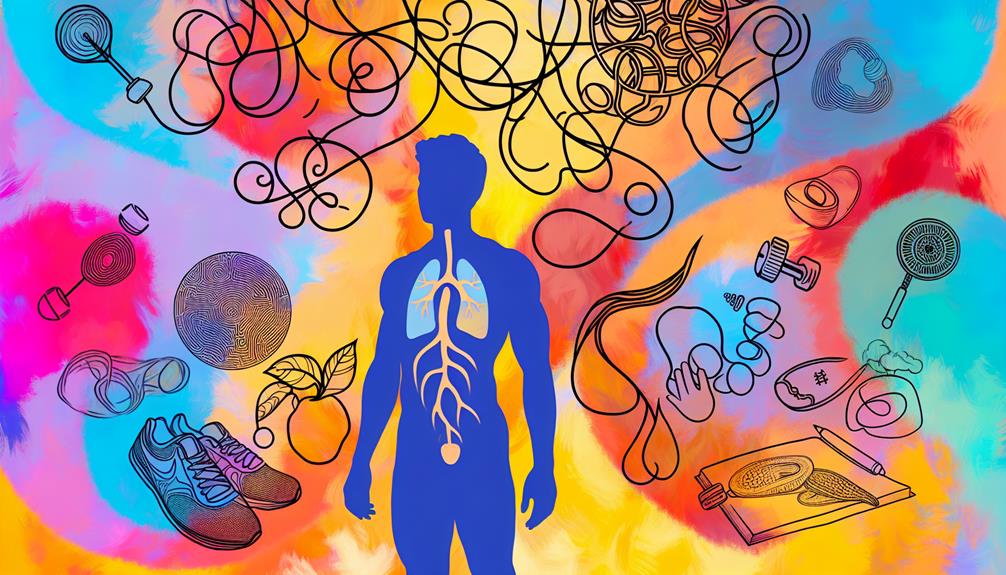When evaluating the key factors influencing endocrine system health in men, I find that hormonal imbalances, nutrition, physical activity, stress levels, environmental toxins, sleep quality, and medical conditions play essential roles. Hormonal imbalances can lead to a range of issues, while important nutrients like Vitamin D and Omega-3 fatty acids directly affect hormone production. Regular exercise promotes hormonal balance, whereas chronic stress elevates cortisol, disrupting normal function. Additionally, poor sleep greatly impacts hormonal regulation. Understanding these interconnected elements is critical for maintaining ideal endocrine health, and there's much more to explore about effective strategies for improvement.
Importance of the Endocrine System

The endocrine system is vital for maintaining overall health, with its complex network of glands influencing numerous bodily functions. As I've explored the intricacies of this system, I've gained a deeper appreciation for how it orchestrates hormonal regulation throughout the body. Each gland, from the pituitary to the adrenal glands, releases specific hormones that act as chemical messengers, coordinating various physiological processes such as metabolism, growth, and stress response.
One important aspect I've noticed is how these hormones maintain homeostasis, ensuring that our internal environment remains stable despite external changes. For instance, insulin plays a pivotal role in regulating blood glucose levels, while cortisol helps manage our body's response to stress. It's fascinating to see how a delicate balance is necessary; too much or too little of a hormone can lead to significant health issues.
Moreover, the endocrine system's influence extends beyond mere hormonal regulation of bodily functions. It interacts with other systems, such as the nervous and immune systems, creating a complex web of communication that impacts overall well-being. I've come to understand that the health of the endocrine system is foundational for ideal functioning, both physically and mentally.
Ultimately, recognizing the importance of the endocrine system encourages proactive health choices. By prioritizing its health, I can enhance my body's ability to regulate hormones effectively, thereby supporting my overall health.
Hormonal Imbalances in Men
Hormonal imbalances in men can greatly disrupt the delicate equilibrium maintained by the endocrine system. These imbalances often manifest in various ways, affecting not just physical health but also psychological well-being. The reasons behind these imbalances can be complex, often linked to aging effects, environmental factors, and underlying endocrine disorders.
In my experience, the most prominent symptoms I've observed include:
- Mood swings: Fluctuations in mood can be unsettling and are often tied to testosterone levels.
- Libido changes: A noticeable decline in sexual desire can greatly impact personal relationships and self-esteem.
- Fertility issues: Hormonal imbalances can lead to decreased sperm production, complicating family planning.
Furthermore, conditions like metabolic syndrome and insulin resistance can exacerbate hormonal issues, creating a vicious cycle. Testosterone therapy and hormone replacement may offer relief for some men, especially those facing the challenges of aging and its effects. However, it's essential to evaluate prostate health when pursuing such treatments, as they can sometimes elevate risks.
Addressing hormonal imbalances is important for overall well-being. Recognizing the signs early allows for timely intervention, potentially mitigating the impacts of endocrine disruptions. A thorough approach, including lifestyle modifications and medical consultations, can lead to improved quality of life. Understanding these issues can empower men to take control of their endocrine health and make informed decisions about their treatment options.
Role of Nutrition

In examining the role of nutrition in endocrine health, I find it essential to understand how necessary nutrients directly influence hormone production and regulation. Excessive sugar intake can disrupt hormonal balance, while healthy fats are important for hormone synthesis. By focusing on these dietary components, we can better support ideal endocrine function in men.
Essential Nutrients for Hormones
Understanding how essential nutrients influence hormone production and regulation is fundamental for maintaining ideal endocrine health. Nutritional deficiencies can lead to hormonal imbalances, which may adversely affect overall well-being. Among the key nutrients, I've found that certain vitamins and fatty acids play significant roles.
- Vitamin D: This vitamin is critical for testosterone production and overall hormonal balance. Insufficient levels can lead to decreased libido and mood disorders.
- Omega 3 Fatty Acids: These essential fats contribute to the production of various hormones, including those involved in inflammation control and mood regulation. They can positively influence testosterone levels and overall endocrine function.
- Zinc: This mineral is important for testosterone synthesis and supports the functioning of the thyroid gland, which regulates metabolism and energy levels.
Incorporating these nutrients into my diet has been beneficial. For instance, I prioritize foods rich in vitamin D, such as fatty fish and fortified products, while also ensuring a sufficient intake of omega 3s from sources like walnuts and flaxseeds. By focusing on these essential nutrients, I can help maintain my hormonal balance and support my endocrine system effectively.
Impact of Sugar Intake
Although many may not realize it, excessive sugar intake can greatly disrupt endocrine health, leading to hormonal imbalances that affect overall well-being. The body's sugar metabolism plays a vital role in maintaining energy balance and hormonal feedback. High fructose consumption, often found in processed foods and sugary beverages, can lead to insulin resistance, a key component of metabolic syndrome. This condition not only increases the risk of type 2 diabetes but also affects testosterone levels, which can further impact mood and energy levels.
Moreover, the glycemic index of foods markedly influences sugar cravings and subsequent eating behaviors. Foods with high glycemic indices can cause rapid spikes in blood sugar, leading to a cycle of cravings and overeating, which compounds insulin resistance issues. Following dietary guidelines that emphasize whole foods and limit added sugars is essential for maintaining endocrine health.
Additionally, the impact of various sweeteners on hormonal balance is an area of growing research. Understanding how these substances affect our bodies can help us make informed choices. By moderating sugar intake and being mindful of nutrition, we can better support our endocrine system and overall health.
Benefits of Healthy Fats
Healthy fats play an essential role in maintaining endocrine system health, particularly in men. These fats are important for hormone production and regulation, impacting everything from testosterone levels to overall metabolic function. I've found that incorporating healthy fats into my diet can yield significant benefits, especially when sourced from quality providers.
Here are some key advantages of healthy fats:
- Hormonal Balance: Healthy fats support the synthesis of steroid hormones, including testosterone, which is crucial for male reproductive health.
- Inflammation Reduction: Omega-3 sources, like fatty fish and flaxseeds, are known for their anti-inflammatory properties, which can enhance overall endocrine function.
- Improved Absorption: Healthy oils, such as olive and avocado oil, aid in the absorption of fat-soluble vitamins that are important for hormone production.
Impact of Physical Activity
Regular physical activity plays an essential role in maintaining endocrine system health in men. Engaging in structured exercise routines enhances hormonal balance, which is essential for overall well-being. It's fascinating to observe how regular physical fitness can profoundly influence endocrine functions, such as testosterone production and insulin sensitivity.
When I incorporate consistent exercise into my life, I notice significant changes in my energy levels and mood, largely due to the positive effects on hormones like endorphins and cortisol. Studies indicate that aerobic exercises, like running or cycling, can boost testosterone levels, which are critical for muscle mass and libido. On the flip side, resistance training has been shown to improve insulin sensitivity, reducing the risk of type 2 diabetes, a condition increasingly linked to hormonal imbalance.
Moreover, the type and intensity of my exercise routines matter. High-intensity interval training (HIIT) can trigger a robust hormonal response, optimizing growth hormone and testosterone levels. This is essential for men looking to enhance not just physical fitness but also metabolic health.
I've also found that combining different forms of exercise—cardio, strength training, and flexibility work—yields the best results. It's important to maintain a well-rounded approach to physical fitness to support endocrine health effectively. To conclude, integrating regular physical activity into my lifestyle isn't just about aesthetics; it's a critical component in promoting hormonal health and overall endocrine system function.
Effects of Stress

Physical activity can greatly counteract the negative effects of stress on the endocrine system in men. Chronic stress can lead to elevated cortisol levels, which may disrupt hormonal balance and impact mental health. In my experience, effective stress management is essential for maintaining endocrine health. Implementing specific coping strategies can greatly reduce stress and enhance emotional resilience. Here are three important components to evaluate:
- Mindfulness Techniques: Engaging in mindfulness practices helps in calming the mind and reducing anxiety. This can create a more balanced hormonal environment.
- Relaxation Exercises: Activities such as yoga or deep-breathing exercises can lower cortisol levels and promote relaxation, which is critical for overall endocrine function.
- Lifestyle Changes: Adopting healthier habits, like regular physical activity and a balanced diet, can serve as powerful tools for stress reduction.
Incorporating these strategies into my routine has been transformative. I've noticed that by actively managing stress, I can mitigate the adverse effects of chronic stress on my body. These lifestyle changes not only support my endocrine system but also improve my overall mental health. By focusing on stress reduction through effective coping strategies, I've become more resilient to the challenges life throws my way. Ultimately, understanding the intricate relationship between stress and endocrine health empowers me to take proactive steps toward better well-being.
Environmental Toxins
Many men might not realize how environmental toxins can greatly impact their endocrine health. As I explore this topic, I find it essential to understand that chemical exposure from various sources plays a significant role in disrupting hormonal balance. Endocrine disruptors, such as plastic additives and heavy metals, are prevalent in our daily lives. They can seep into our bodies through food, air, and water, leading to potential health complications.
Pollution sources, including industrial waste and vehicle emissions, contribute to poor air quality, which can exacerbate exposure to these harmful substances. Occupational hazards are another area of concern; certain professions expose men to high levels of toxic chemicals that can interfere with hormonal function. Additionally, household chemicals, often overlooked, can contain endocrine-disrupting compounds that accumulate over time and affect health.
Water contaminants further complicate the issue. Many communities grapple with pollutants that can leach into drinking water, posing long-term risks. It's important to recognize that even minor chemical exposures can have cumulative effects, leading to significant disruptions in the endocrine system.
Sleep Quality and Hormones

I've observed that sleep duration markedly influences hormone levels, particularly testosterone and cortisol. When sleep quality is compromised due to disorders, the repercussions on endocrine function can be profound. Understanding these relationships is essential for maintaining ideal hormone health in men.
Sleep Duration Impact
When it comes to understanding the interplay between sleep duration and hormonal health, it's essential to recognize how both sleep quality and quantity can greatly influence the endocrine system. Sleep deprivation disrupts normal sleep cycles, leading to imbalances in hormonal regulation. This disruption can severely affect melatonin production, which plays a significant role in maintaining our circadian rhythm.
To illustrate this, consider the following key impacts of inadequate sleep:
- Disrupted Sleep Patterns: Inconsistent sleep schedules can hinder the body's ability to enter REM sleep, essential for restoring hormonal balance.
- Impaired Melatonin Production: Insufficient restorative sleep reduces melatonin levels, impacting overall hormonal health.
- Increased Stress Hormones: Chronic sleep deprivation can elevate cortisol levels, further disrupting endocrine functioning.
As I've observed, maintaining consistent sleep patterns not only improves sleep quality but also supports effective hormonal regulation. Prioritizing restorative sleep is important for men working to optimize their endocrine health, as it enables the body to undergo necessary hormonal adjustments and rejuvenation during sleep cycles. By focusing on enhancing both sleep duration and quality, we can foster a healthier endocrine system.
Sleep Disorders Effects
Sleep disorders can greatly impair hormonal health, creating a cascade of effects on the endocrine system. Conditions like sleep apnea disrupt restorative sleep, affecting sleep architecture and leading to fragmented REM sleep. This fragmentation can hinder melatonin production, essential for regulating circadian rhythms, which directly influences hormone regulation.
Sleep deprivation, whether from insomnia or other disorders, can result in significant insomnia consequences, including increased cortisol levels and decreased testosterone. These hormonal imbalances can affect everything from mood to metabolic health. Poor sleep hygiene exacerbates these issues, as irregular sleep patterns prevent the body from achieving the necessary deep and REM sleep required for proper hormone synthesis and balance.
In my observations, those struggling with sleep disorders often experience a vicious cycle: hormonal dysregulation leads to further sleep disturbances, perpetuating the problem. It's vital to address these sleep issues early on to support endocrine health. By improving sleep hygiene—such as maintaining a consistent sleep schedule and creating a restful environment—individuals can enhance their sleep quality and, in turn, improve their hormonal health. Prioritizing restorative sleep isn't just beneficial; it's essential for overall well-being.
Medical Conditions and Hormones
Numerous medical conditions can profoundly impact hormonal balance in men, leading to a cascade of physiological effects. I've seen firsthand how issues such as metabolic disorders and age-related changes can disrupt hormonal regulation, often manifesting in altered testosterone levels and reproductive hormones. The interplay between these conditions and our endocrine system is intricate, and understanding it is essential for maintaining overall health.
Consider the following key factors:
- Thyroid function: Hypothyroidism can lead to decreased testosterone levels, affecting energy and libido.
- Adrenal health: Adrenal dysfunction, often triggered by chronic stress, can disrupt the production of hormones like cortisol, impacting metabolic processes and insulin sensitivity.
- Pituitary gland issues: The pituitary gland plays a significant role in regulating reproductive hormones; disorders here can lead to compromised testosterone production.
Endocrine disruptors also pose an increasing threat, with chemicals in our environment influencing hormone levels and thyroid function. These disruptions can lead to a vicious cycle affecting not just individual hormones but overall metabolic health.
As men age, it's essential to recognize that hormonal health is not static; it can change due to these medical conditions. For instance, diminished adrenal health can result in decreased energy levels, while poor insulin sensitivity may lead to increased fat storage, further exacerbating hormonal imbalances. Understanding these connections is fundamental in the quest to maintain ideal endocrine health.
Strategies for Improvement

Addressing the hormonal imbalances caused by various medical conditions requires targeted strategies for improvement. In my experience, implementing lifestyle modifications is essential. This involves adopting a balanced diet rich in whole foods, healthy fats, and lean proteins. Regular physical activity not only aids in weight management but also enhances hormone regulation.
Supplementation options can also play a significant role, particularly when specific deficiencies are identified. For instance, Vitamin D and zinc are often linked to testosterone production; therefore, consulting with a healthcare professional to assess individual needs is important.
Incorporating mindfulness practices such as meditation or yoga can help mitigate stress, which is known to disrupt hormonal balance. These techniques promote relaxation and can lead to improved overall health.
Another often overlooked aspect is hydration importance. Staying adequately hydrated supports metabolic processes and aids in the effective functioning of the endocrine system. I recommend aiming for a daily intake of at least 2-3 liters of water, adjusting according to individual needs and activity levels.
Age considerations are also essential. As men age, hormonal fluctuations become more pronounced, necessitating more proactive health measures. This means not only focusing on lifestyle but also scheduling regular check-ups to monitor hormonal levels and overall health status.
Frequently Asked Questions
How Do Genetics Influence the Endocrine System Health in Men?
Isn't it ironic how we often overlook our own genes when discussing health? Genetics plays an important role in hormonal regulation, shaping our body's responses and predispositions. I've found that our genetic predisposition can greatly influence how effectively our endocrine system functions. For men, this means that inherited traits can dictate everything from hormone levels to disease susceptibility. Understanding this connection is essential for optimizing our overall health and well-being.
Can Supplements Improve Hormonal Balance in Men?
I've often wondered if supplements can genuinely improve hormonal balance in men. While some studies suggest they might help, I believe it's essential to contemplate natural remedies and dietary choices as foundational. For instance, incorporating foods rich in zinc and omega-3s can enhance hormonal health. Supplements may offer benefits, but I think a holistic approach, focusing on nutrition and lifestyle, is vital for achieving ideal endocrine function.
What Role Does Hydration Play in Endocrine Health?
I've found that hydration levels greatly impact hormonal balance. When I stay well-hydrated, my body can effectively regulate hormones like cortisol and testosterone. Dehydration can disrupt these levels, leading to fatigue and mood swings. It's essential to maintain adequate hydration to support the endocrine system's functions. I've noticed that even slight changes in my water intake can influence my overall well-being and energy, highlighting hydration's vital role in sustaining hormonal health.
Are There Specific Age-Related Changes Affecting the Endocrine System?
Did you know that by age 60, testosterone levels can drop by 30%? This age-related decline in hormones leads to noticeable fluctuations, considerably impacting mood and energy levels. Lifestyle factors, like poor diet and lack of exercise, can exacerbate these changes. Additionally, stress effects on the endocrine system can further disrupt hormone balance. It's essential to understand these changes as we age to maintain ideal health and well-being.
How Do Medications Impact Hormonal Health in Men?
I've noticed that medications can considerably impact hormonal health. Different medication types, especially those for chronic conditions, can alter hormonal balance through dosage effects. Long-term use often leads to side effects that may exacerbate hormonal issues. I've found that prescription changes can sometimes help, but alternative treatments and lifestyle adjustments, like stress management, can also play an important role in maintaining overall hormonal health. It's essential to monitor these factors carefully.
